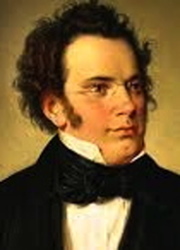Schubert's Symphonies—His Developments 1818–1822
David Calow uses visual presentations of the
scores and calls upon his own experience of
conducting Brian Newbould’s reconstructions
of Schubert’s late symphonies with the
Rutland Sinfonia. After No. 6, Schubert made
several sketches of a symphony in D and a
full sketch of No 7 in E minor/major
culminating with the ‘Unfinished’ Symphony 8
with reconstructions of the full scherzo and
using the B minor Entr’acte from Rosamunde.

Appreciation by Neil Crutchley
I’m pretty sure this talk came as a revelation to everyone present. Schubert not only left the “Unfinished Symphony” unfinished; by the time of his death there were at least six incomplete symphonies—all of which contain at least some small “fingerprint” of the mature Schubert as we saw from the written music—and heard from recordings of the orchestrated fragments. In some cases these fragments amounted to surprisingly substantial sketches and in the case of No.7, a complete work. They were realised by Professor Brian Newbould, whose ground breaking work in this field provided the basis for this fascinating talk.
As a conductor of considerable experience himself, David was able to analyse and evaluate these examples with skill and insight. He also put forward a convincing theory as to why Schubert began and then abandoned so many symphonic scores.
In the case of the great “Unfinished” a complete scherzo in piano score exists along with two pages of the composer’s own orchestration and Professor Newbould’s completion of trio section gives a full, playable movement and this, along with the use of music from the big B minor entr’acte from Rosamunde (which, it seems, could have been the finale to the symphony all along), completes the work. It’s an interesting theory, but as David observed, the inspirational flame burns a little lower in the two “completed” movements.
We’ll probably never know exactly why Schubert left so many symphonies unfinished but thanks to this meticulously prepared talk, we now have plenty of food for thought.


